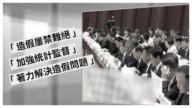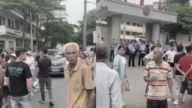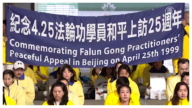【新唐人2011年5月31日讯】中国网路“打金”游戏盛行,犯人也被利用在虚拟世界中赚钱。媒体报导,大陆监狱为了弥补财政缺口,利用囚犯廉价的劳动力,为狱方创造收入,而大玩金钱游戏。
一名曾经在黑龙江鸡西市服过刑的劳教犯,向英国的《卫报》(The Guardian)披露,自己在服刑期间,白天要劳动12小时,晚上还要上网“打金”——玩游戏积累点数,为狱警赚钱。
而过去国际媒体也曾经报导,为了“创收”,大陆一些监狱多会利用自己的权力来赚钱。还发生过出售死囚器官、向探监者收取“见面费”、甚至还开设“特殊见面室”供囚犯娱乐的现象。
曾经在监狱里度过三年零八个月的中国经济学者綦彦臣表示,监狱靠犯人的廉价劳动力挣取低端收入的事情是存在的。
中国经济学者綦彦臣:“中国监狱包括看守所,它的劳动系统,在劳动市场产品结构里的分工,它就要作高时间、高人力投入、低技术含量的这种工作。因为监狱人多,最主要的是不用付工资。他在沧州市第一看守所,狱警甚至当着犯人面前说,可以让家里拿钱来买劳动量。”“被羁押的犯人不但本身受盘剥,家庭也要受盘剥。比如你劳动过量你要吃鸡蛋,甚至吃烧鸡,这些钱哪里来?就是你家供养你在此的营养成分,主要按他们的劳动量。他(监狱队长)公开的当着200多犯人讲,你可以不干活,像政治犯一样,他们家每月给点钱,他要每月交给我200块钱,我就什么事情都不让他做了。”
中国民主党负责人何德普2003年被捕,北京中级法院以“煽动颠覆国家政权罪”,判处他有期徒刑8年。今年1月24号刑满出狱的何德普向《新唐人》表示,大陆监狱长期存在向犯人高价出售物品的现象。
中国民主党负责人何德普:“每个监狱可能形式不同,方式也不一样,但是都是对犯人进行剥削、对犯人进行压迫,这个是有共性,向犯人出售高价香烟、向犯人高价出售食品,从犯人身上赚取差价。”
何德普表示,犯人的伙食费也是监狱“创造收入”的一部分。他说,北京的监狱核算犯人每个月的伙食费是一人180元北京的监狱提供犯人每人一个月180元伙食费,但犯人只能吃到百分之十,监狱伙食非常差,他曾经多次提出抗议,但长期以来不见改善,因为这和监狱长有利益冲突。
何德普:“任命生活卫生科科长就是监狱长任命的,他提出任命了,这个职位他有赚钱的机会,任命制,所以他任命这官儿,这官儿就有从中牟私利方面的条件,所以主要责任还在监狱长。”
浙江民主人士范子良,在浙江省金华十里坪劳教所经历了二年的监狱生活,他说,监狱里送钱也可以加分减刑。
范子良:“我在那儿的时候就作打火机,到市场上去卖,有的织那羊毛衫。这个任务很紧的,有的没有办法,完不成任务,甚至自杀的也有。有一个温州人自杀了好几次耶!我记得我那个班长,他坐两年或三年牢,他花了15万多,包括这里头的花费。一般用不着带钱进去。”
中国大陆的监狱在财政拨款压缩下,为了维持开销,用尽各种方式创造收入,也创造出中国式的监狱特色。“劳改基金会”今年发表的一份报告显示,中国有一百多家劳改工厂在互联网用英文做广告,向包括美国在内的国际市场宣传出口劳改产品。
新唐人记者梁欣、李庭、李月采访报导。
Prisoners Forced to Play Money Games
Internet money games are popular in China.
Prisoners are forced to play and make “money”
in the virtual world for the prison. In China,
jails use cheap prisoners’ labor to make profit.
An ex-prisoner from Heilongjiang province
disclosed to The Guardian that while in jail,
he worked 12-hours a day, and in the evening
he had to play an Internet “money game”
to accumulate points for jail guards.
International media reported that to make money,
Chinese prisons have sold prisoners’ organs,
collected fees for family visits,
and even set up a “special meeting room”
for the new gaming phenomenon.
Qi Yanchen, an economist once imprisoned,
confirmed the use of prisoners to make money.
Qi Yanchen: “Prisons and detention centers
in China have a labor system of long hours,
heavy labor input, and low technical command.
Prisoners are many, and no salaries are paid.”
Qi witnessed at a detention center in Changzhou
a guard saying to prisoners that they could pay
to get themselves out of doing labor.
Qi Yanchen: “Prisoners and their families
are exploited. You are overworked, want to eat
eggs, chicken, but where to get the money from?
Your family must pay, based on your workload.
A prison guard said openly to over 200 prisoners
that they do not have to work if their families pay.
“Give me RMB200 a month, I’ll let you off work.”
Democratic leader He Depu was arrested in 2003,
and sentenced to 8 years for subversion.
He came out this January, and said to NTD
that prisons charge high prices on goods.
He Depu: “Each prison may use different means,
but all exploit prisoners and oppress them.
They sell cigarettes and food at high prices.”
He said, prisons make money of prisoners’ food.
Beijing prisons claim food cost per prisoner
is RMB180 per month, but is only one tenth of it.
Food quality is extremely poor.
He protested repeatedly, but in vain.
This is due to prison guards’ money interests.
He Depu: “Prison guard in charge of daily costs
is appointed by the head guard and this is
a money-making opportunity, so he makes profit,
and the problem is still with the head guard.”
Democracy activist Fan Ziliang was jailed
for 2 years in Zhejiang province.
He said bribery can help reduce the sentence.
Fan: “I was making cigarette lighters in there,
some made cashmere sweaters. Some could not
meet the quota and committed suicides. A fellow
from Wenzhou tried to kill himself several times.
My warder spent RMB150,000+ for 2-3 years there.
Usually you don’t bring money in the jail.”
Government funding for prisons has decreased.
To operate, prisons use all means to make money.
This is a prison with Chinese characteristics.
Laogai Foundation reported this year
that over 100 labor camps advertise their products
on the international market, including the U.S.
NTD reporters Liang Xin, Li Ting and Li Yue




























